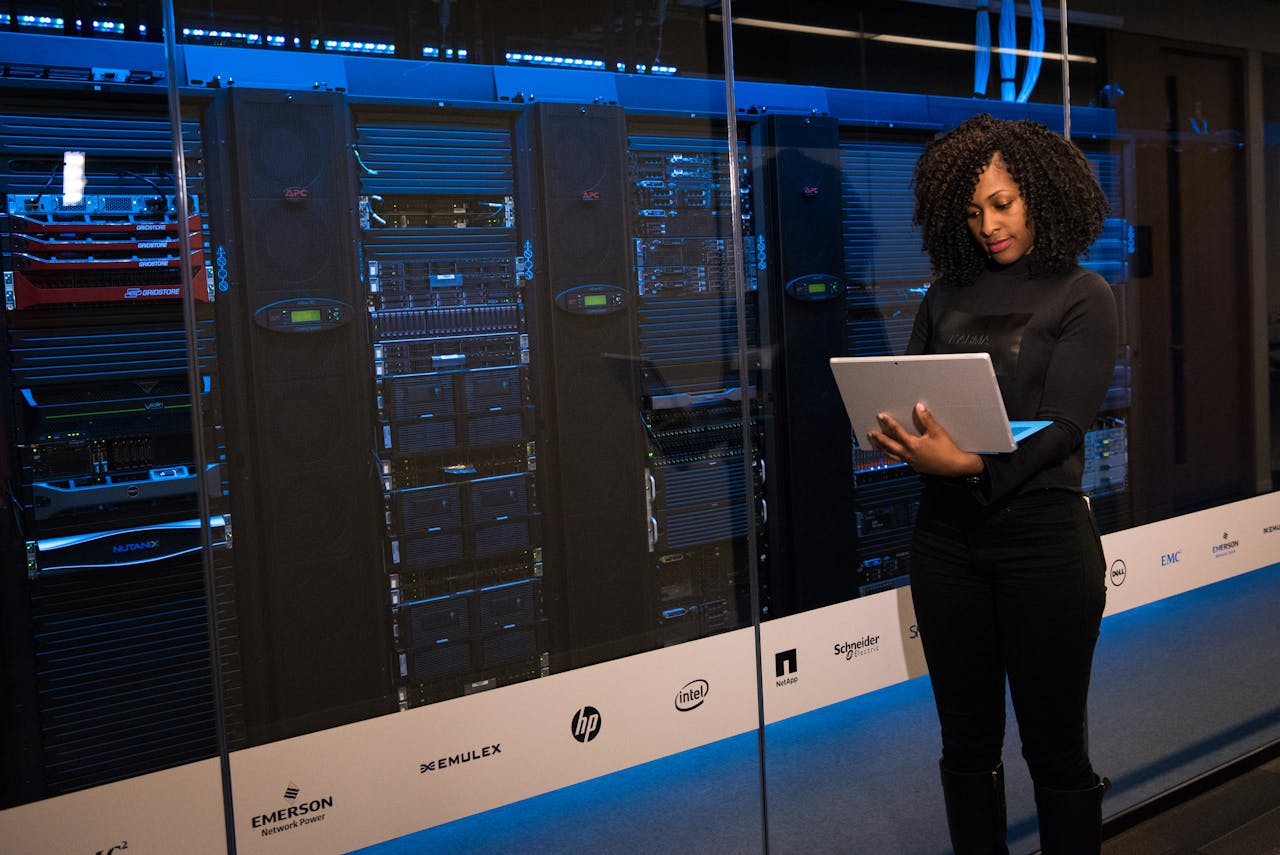What Is a Bare Metal Server For Business?
-
April 23, 2024
-
7 min read

Every enterprise needs a high-performing computing environment. This environment is the backbone for efficient workflows, seamless communication, and effective data management. The elements involved are a robust network infrastructure, ample storage capacity, and sophisticated software applications.
A bare metal server and a cloud server both serve the purpose of hosting and managing computational resources, but they differ in their architecture and deployment. A bare metal server refers to a physical server dedicated to a single tenant or organization.
In contrast, a cloud server operates within a virtual environment. Resources are allocated and managed by a cloud service provider. Here is a guide to the fundamentals of bare metal servers.
Bare metal servers: An introduction
A bare metal server is also referred to as a dedicated server. It is meant to serve the needs of a single organization. At the heart of a bare metal server lies essential components such as the central processing unit (CPU), random-access memory (RAM), and storage drives. It ensures optimal performance and efficiency and enables enterprises to leverage the full potential of their computing infrastructure.
Robust connectivity is essential for seamless communication and data transfer within the ecosystem. Airtel offers a range of network solutions tailored for enterprises. These solutions include high-speed internet connectivity, dedicated network links, and robust security protocols.
A bare metal server leads to optimal performance, reliability, and security. It facilitates rapid data processing, complex computations, and resource-intensive applications.
Check Out: DDoS Security Solutions for your business
From selecting the operating system and software stack to fine-tuning hardware configurations, organizations have complete control over all aspects of server infrastructure. It facilitates seamless integration with existing workflows and business processes.
| Feature | Bare Metal Server | Cloud-Based Server |
| Ownership | Owned or leased by user | Virtual servers by cloud service provider |
| Scalability | Can require hardware expansion | Can scale up or down as needed |
| Deployment Time | Physical setup time required | Rapid deployment |
| Maintenance | User/provider responsible for maintenance and upgrades | Cloud provider handles maintenance |
| Flexibility | May require hardware changes | Can adjust resources on demand |
| Security | Direct control over security and configuration | Security by cloud provider, with levels of control for users |
| Privacy | High data privacy and compliance | Dependent on cloud provider’s policies.
|
The Structure of a Bare Metal Server
A bare metal server comprises the hardware components necessary for carrying out computing tasks efficiently. At its core, it includes fundamental elements like the central processing unit (CPU), random access memory (RAM), and storage devices. The structure also includes a range of peripherals for seamless operation. These encompass network interface cards (NICs) and other devices for specific tasks.
The motherboard is the backbone, facilitating communication and coordination among various hardware elements. The power supply unit ensures consistent and reliable power delivery. Firmware acts as the intermediary between hardware and software, facilitating the boot-up process and enabling hardware-level optimization.
Finally, the operating system serves as the interface through which users interact with the server, managing resources and executing tasks.
Typically housed within a data center on-premises, a bare metal server operates within a controlled environment for performance and reliability. Bare metal server hosting should include proper connectivity, power redundancy, and environmental controls.
Setting Up a Bare Metal Server
Setting up a bare metal server involves several steps. Here is an overview.
- Define enterprise needs such as workload, users, and requirements.
- Select components like CPU, RAM, storage drives and network interface cards.
- Obtain the operating system installation media.
- Mount components like CPU, RAM, and storage drives.
- Attach peripherals such as keyboard, mouse, and monitors.
- Boot the server and install the OS.
- Install software and configure network and security settings.
- Configure firewalls and access controls.
The best bare metal server provider will ensure that each of these steps is carefully executed.
The Benefits of Using a Bare Metal Server
There are many advantages of using a bare metal server for business. The main benefits are as follows:
Performance:
- Bare metal servers provide exceptional performance by offering dedicated access to hardware resources.
- With exclusive access to the CPU, RAM, and storage, enterprises can achieve optimal performance for their workloads and applications.
- This performance advantage is beneficial for demanding tasks and resource-intensive applications.
Customization:
- Users have full control over the server environment, allowing them to customize configurations according to specific requirements.
- They can install and configure software applications tailored to business needs without virtual restrictions.
- Customization enables businesses to optimize server settings and fine-tune performance parameters for maximum efficiency and productivity.
Security:
- Bare metal servers offer enhanced security and data privacy as they are dedicated solely to a single user or organization.
- With no shared resources or multi-tenancy, the risk of security breaches and unauthorized access is reduced.
- Enterprises have greater control over security measures, including firewall configurations, access controls, and encryption protocols.
Scalability:
- Bare metal servers provide scalability options to accommodate the growing needs of businesses over time.
- Hardware resources can be upgraded or scaled out by adding more servers to the infrastructure.
- Leading bare metal server providers offer flexible scaling solutions, allowing businesses to expand computing resources without disruptions.
- Businesses can adapt easily to changing workloads and demands without compromising performance or reliability.
In short, bare metal servers offer several advantages for businesses, including unparalleled performance, extensive customization capabilities, enhanced security and data privacy, and seamless scalability to meet evolving business requirements.
Identifying the Ideal Users for Bare Metal Servers
Bare metal servers are well-suited for businesses that rely on data processing, analytics, and high-performance computing to drive their operations.
- For instance, financial institutions that require high-performance computing resources to handle complex calculations, algorithmic trading, risk analysis, and real-time transaction processing. Security and data privacy needs are also paramount.
- Bare metal servers are also used by healthcare organizations that deal with large volumes of patient and medical data.
- The gaming industry, too, relies on powerful servers for hosting multiplayer games, managing virtual environments, and delivering high-quality graphics.
- Finally, businesses subject to compliance or regulatory standards find bare metal servers advantageous for meeting specific requirements.
Bare metal server pricing depends on the specific needs of the enterprise. They serve as a reliable infrastructure solution across various industries.
Bare Metal Server Management
Bare metal servers for business need vigilant monitoring and optimization for best results. Maintenance tasks such as software updates and security measures are important for safeguarding servers from vulnerabilities and ensuring smooth operations.
Best practices in bare metal server management involve fine-tuning configurations to enhance resource utilization. Capacity planning also plays a role in preparing for future growth.
Many businesses outsource their bare metal server hosting to specialized providers, leveraging their expertise. They gain access to round-the-clock support and maintenance, relieving internal teams of the burden of server management.
Bare metal server pricing depends on factors such as the required resources and the level of support. Packages offer flexibility to businesses with diverse needs and budgets.
Summing up
Bare metal servers are essential components of enterprises that need high-performance computing environments. They are dedicated physical servers that offer reliability and customisation. Bare metal servers are ideal for businesses requiring performance-intensive workloads, security, and control over their server environment. Typical examples are finance, healthcare, gaming, and research. The setup involves hardware selection, installation, and configuration. For best results, businesses should outsource server installation and management to a reliable provider.
Get in touch with Airtel Business to find out more about the best bare metal server solutions for business.
 Share
Share








